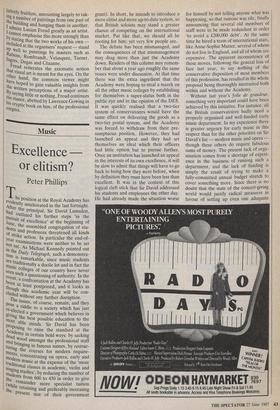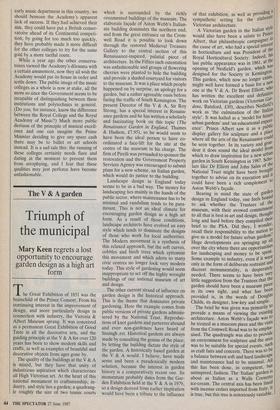M us ic
Excellence or elitism?
Peter Phillips
evidently ameliorated in the last fortnight. After the principal, Sir David Lumsden, had outlined his further steps 'in the pursuit of excellence' at the beginning of June, the assembled congregation of stu- dents and professors threatened all kinds of strike action. In particular the end-of- year examinations were neither to be set not sat. As Michael Kennedy pointed out in the Daily Telegraph, such a demonstra- tion is remarkable, since music students are traditionally a docile lot and in fact the music colleges of our country have never seen such a questioning of authority. In the event, a confrontation at the Academy has been at least postponed, and it looks as tho lu ugh this academic year will be con-
without any further disruption.
The issues of course, remain; and they Pose a riddle to a society which has just re-elected a government which believes in living the best possible education to the most able minds. Sir David has been proposing to raise the standard at the dAcademy in certain bold ways: by sacking ead wood amongst the professional staff and bringing in famous names, by restruc- turing the courses for modern require- ments, concentrating on opera, early and modern music at the expense of the 'more aditional classes in academic, violin and singing studies', by reducing the number of students from 600 to 450 in order to give the remainder more specialist tuition
the Present size of their government grant). In short, he intends to introduce a more elitist and more up-to-date system, so that British soloists may stand a greater chance of competing on the international market. Put like that, we should all be rooting for him; yet very few people are.
The debate has been mismanaged, and the consequences of that mismanagement may drag more than just the Academy down. Readers of this column may remem- ber that about a year ago roughly the same issues were under discussion. At that time there was the extra ingredient that the Academy were hoping to steal a march on all the other music colleges by establishing for themselves a super-status both in the public eye and in the opinion of the DES. It was quickly realised that a two-tier system of conservatoires would have the same effect on delivering the goods as a two-tier postal system, and the Academy was forced to withdraw from their pre- sumptuous position. However, they had launched an appeal and they had set themselves an ideal which their officers had little option but to pursue further. Once an institution has launched an appeal in the interests of its own excellence, it will be slow to admit that things will have to go back to being how they were before, when by definition they must have been less than excellent. It was in the context of this logical cleft stick that Sir David addressed his students and employees the other day. He had already made the situation worse
for himself by not telling anyone what was happening, so that rumour was rife, finally announcing that several old members of staff were to be made redundant in order `to avoid a £200,000 debt'. At the same time he hired a team of international stars, like Anne-Sophie Mutter, several of whom do not live in England, and all of whom are expensive. The apparent inconsistency of these moves, following the general loss of face last year, to say nothing of the conservative disposition of most members of this profession, has resulted in the whole proposal being thoroughly mistrusted both within and without the Academy.
Without last year's folie de grandeur, something very important could have been achieved by this initiative. For instance, all the British conservatoires badly need a properly organised and well-funded early music department. In my experience there is greater urgency for early music in this respect than for the other priorities on Sir David's list — modern music and opera though these others do require fabulous sums of money. The present lack of orga- nisation comes from a shortage Of experi- ence in the business of running such a department, and the lack of funding is simply the result of trying to make a fully-committed annual budget stretch to cover something more. Since there is no doubt that the state of the concert-giving world would justify radical measures in favour of setting up even one adequate early music department in this country, we should bemoan the Academy's apparent lack of success. If they had achieved their aim, they could have put a British conser- vatoire ahead of its Continental competi- tion; by going for too much too quickly, they have probably made it more difficult for the other colleges to try for the same goal by a more tactful route.
While a year ago the other conserva- toires viewed the Academy's dilemma with a certain amusement, now they all wish the Academy would put its house in order and settle down. The public image of the music colleges as a whole is now at stake, all the more so since the Government seems to be incapable of distinguishing between these institutions and polytechnics in general. (Do you, for instance, know the difference between the Royal College and the Royal Academy of Music?) Much more public derision of the principle of musical excell- ence and one can imagine the Prime Minister deciding to give any spare cash there may be to ballet or art schools instead. It is a sad tale this: the running of these colleges certainly needs flare and daring at the moment to prevent them from atrophying, and I fear that these qualities may just perforce have become unfashionable.










































































 Previous page
Previous page